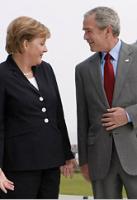After threatening an outright veto of any reference to concrete reductions, the U.S. broke a trans-Atlantic deadlock by agreeing to “seriously consider” such proposals in a deal widely viewed as a compromise by President Bush.
The agreement did not specifically include the 50 per cent reduction sought by German Chancellor Angela Merkel, but it did endorse her request that climate talks take place under the United Nations. It also carried Bush’s proposal to bring the world’s largest polluters – including China and India – together to set emission-reduction goals.
Although the deal enabled the group to reach accord, it does not fundamentally alter the White House’s refusal to accept binding targets for reducing emissions.
Subscribe to our newsletter
Stay up to date with DeSmog news and alerts







